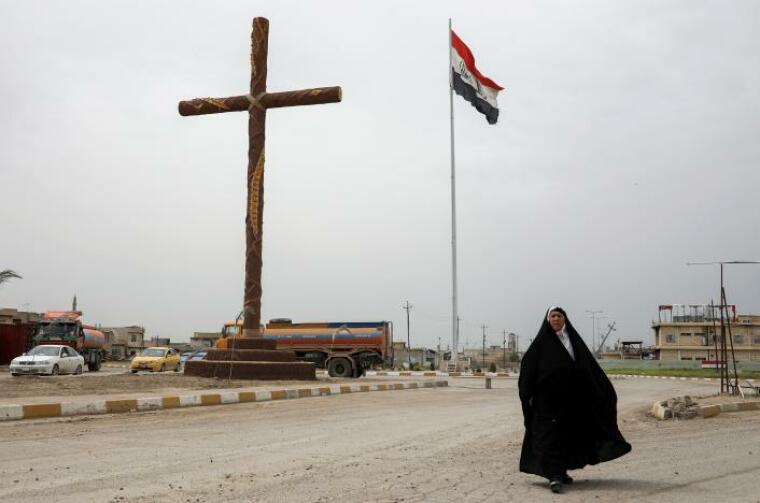New report highlights most effective ways to respond to Christian persecution

Researchers from the University of Notre Dame have released a new report detailing the extent of Christian persecution around the world and the effective strategies believers employ to combat against violations of their religious freedom.
The key findings of the report, titled "In Response to Persecution," was presented by several scholars at the National Press Club on Thursday.
The study is part of the university's Under Caesar's Sword project, which is the first systematic and global investigation into the responses of Christian communities to persecution.
Prior to the panel discussion of the report, Elizabeth H. Prodromou, a professor of conflict resolution at Tufts University, noted that Christians are in "danger of extinction" in the Middle East, in lands where Christianity originated.
"The four ancient patriarchates, in Antioch, Alexandria, Constantinople, and Jerusalem are examples of the deliberate, lethal, persecution and discrimination and repression that Christians in those parts of the world face," she said, according to The Christian Post.
The study indicated that 43 percent of oppressed Christians respond to persecution primarily with what the researchers referred to as "strategies of survival," which includes adapting their lives to blend in with the community, going underground or fleeing the land altogether.
Thirty-eight percent of persecuted believers employ "strategies of association," which focuses on building ties with other Christian communities, non-Christian religions, and secular figures to strengthen resilience.
Only 19 percent of persecuted Christians respond with "strategies of confrontation," where they engage in direct confrontation with a repressive government or non-state entity like a terrorist group. Most of the confrontations are nonviolent, with very few exceptions.
"While strategies of survival and association may not seem dramatic, we should not overlook the creativity, courage and theological conviction that often characterize them," Daniel Philpott, a professor of political science at Notre Dame and one of the directors of the project, said.
"Christian communities take up these short-term strategies with the long-term religious conviction that if they can hold out, a better day will arrive — not only in the life to come, but also perhaps in earthly time," he added.
The researchers involved with the project have also seen some encouraging signs. Prodromou noted that the conflict in the Middle East has prompted Christians of every denomination to work together and get to know each other.
She said that the repair of the fractured church is one of the positive things that is coming out of the conflict.
The researchers will be publishing research-based educational resources, including lesson plans for use in churches, schools, and non-profit organizations, at the beginning of summer 2017.
Under Caesar's Sword is a three-year research endeavor being funded by a grant from the Templeton Religion Trust. The project involves 17 scholars and academic institutions, such as the Notre Dame Center for Ethics and Culture, the Religious Freedom Institute, and Georgetown University's Religious Freedom Research Project.
 Christians don't have to affirm transgenderism, but they can’t express that view at work: tribunal
Christians don't have to affirm transgenderism, but they can’t express that view at work: tribunal Archaeology discovery: Medieval Christian prayer beads found on Holy Island
Archaeology discovery: Medieval Christian prayer beads found on Holy Island Presbyterian Church in America votes to leave National Association of Evangelicals
Presbyterian Church in America votes to leave National Association of Evangelicals Over 50 killed in 'vile and satanic' attack at Nigerian church on Pentecost Sunday
Over 50 killed in 'vile and satanic' attack at Nigerian church on Pentecost Sunday Ukrainian Orthodox Church severs ties with Moscow over Patriarch Kirill's support for Putin's war
Ukrainian Orthodox Church severs ties with Moscow over Patriarch Kirill's support for Putin's war Islamic State kills 20 Nigerian Christians as revenge for US airstrike
Islamic State kills 20 Nigerian Christians as revenge for US airstrike Man who served 33 years in prison for murder leads inmates to Christ
Man who served 33 years in prison for murder leads inmates to Christ


 Nigerian student beaten to death, body burned over ‘blasphemous’ WhatsApp message
Nigerian student beaten to death, body burned over ‘blasphemous’ WhatsApp message 'A new low': World reacts after Hong Kong arrests 90-year-old Cardinal Joseph Zen
'A new low': World reacts after Hong Kong arrests 90-year-old Cardinal Joseph Zen Iran sentences Christian man to 10 years in prison for hosting house church worship gathering
Iran sentences Christian man to 10 years in prison for hosting house church worship gathering French Guyana: Pastor shot dead, church set on fire after meeting delegation of Evangelicals
French Guyana: Pastor shot dead, church set on fire after meeting delegation of Evangelicals ‘Talking Jesus’ report finds only 6% of UK adults identify as practicing Christians
‘Talking Jesus’ report finds only 6% of UK adults identify as practicing Christians Mission Eurasia ministry center blown up in Ukraine, hundreds of Bibles destroyed: 'God will provide'
Mission Eurasia ministry center blown up in Ukraine, hundreds of Bibles destroyed: 'God will provide' Church holds service for first time after ISIS desecrated it 8 years ago
Church holds service for first time after ISIS desecrated it 8 years ago Burger King apologizes for 'offensive campaign' using Jesus' words at the Last Supper
Burger King apologizes for 'offensive campaign' using Jesus' words at the Last Supper Uganda: Muslims abduct teacher, burn him inside mosque for praying in Christ’s name
Uganda: Muslims abduct teacher, burn him inside mosque for praying in Christ’s name